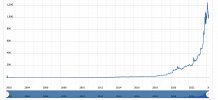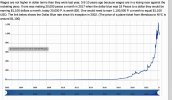I have to agree even without any proof of knowing a young recent graduate earning a decent enough salary. There is banking and finance, mining and petroleum, agriculture, software and tech employers who need these young workers. A look around at a midweek early morning cafe (before I arrive at 9am) or afternoon popular lunch spot you will find them.
That said there is also a growing segment (perhaps 40-50 or more percent?) of population who are moving downward and caught with the high inflation, along with lower or lost wages, which is what I understand from the Original posted topic that started this discussion. A coming recession is not going to help.

:quality(85)/cloudfront-us-east-1.images.arcpublishing.com/infobae/EPK55AOZQBCBHKJ57HNIMJPM6M.jpg)

